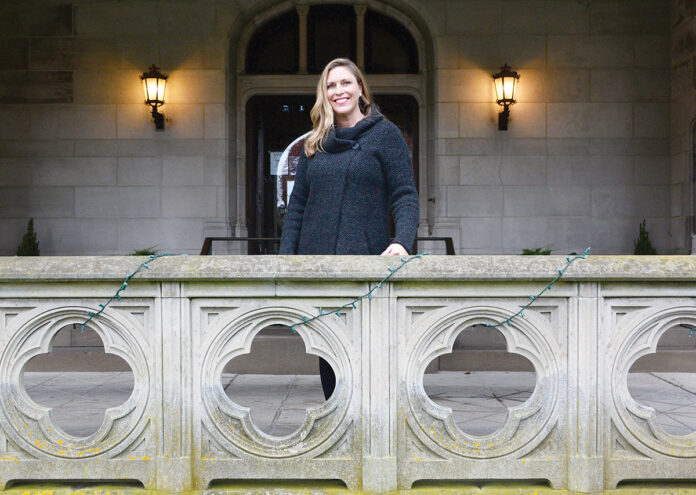Kimberly Silva was a mortgage underwriter for nearly 20 years when the market crashed in 2008. That spurred her to jump into a new career.
She became a certified nursing assistant in Providence, then she decided that she wanted to transition to social work. Without a college degree, she had to go back to school.
Silva enrolled at Rhode Island College and earned a bachelor’s degree and master’s degree in social work in four years. But those degrees came at a cost, including $78,000 worth of federal student loans.
“I knew it would be a challenge in my 40s, but it was what I felt like I needed to do,” said Silva, who is moving back to Rhode Island after living in South Carolina since graduating in 2016. Soon, she will start a job at the HopeHealth Hulitar Hospice Center in Providence as a full-time hospice social worker.
Silva is among the millions of Americans who carry a combined $1.6 trillion worth of student loan debt. Due to the pandemic, Congress had initially paused federal loan payments and interest under the Coronavirus Aid, Relief, and Economic Security Act. President Donald Trump extended that moratorium from Sept. 30 through the end of the year.
If another extension isn’t granted, the federal loan payments will resume after Jan. 1.
‘At this point, I will be buried with my student loans.’
KIMBERLY SILVA, Rhode Island College graduate
Even with a full-time job, Silva, now 52, worries about her ability to make monthly payments on her student loans in such an uncertain economy. And many other borrowers feel the same way, particularly with thousands in Rhode Island left unemployed during the coronavirus crisis.
Efforts are under way to have the federal payment moratorium remain until at least next September. And President-elect Joe Biden has expressed support for erasing at least some student debt after he takes office in January.
In the meantime, associations representing colleges and universities and financial aid administrators have asked U.S. Education Secretary Betsy DeVos to extend the deadline until Dec. 31, 2021.
And members of Rhode Island’s congressional delegation say they have pushed to extend relief programs, including the suspension of federal student loan payments, but the measures have stalled along with talks of a new pandemic relief aid package.
“The [U.S.] House has already passed two bills that would extend the student loan freeze through September,” Sen. Sheldon Whitehouse, D-R.I., told Providence Business News. “These measures have been sitting on Leader [Mitch] McConnell’s desk for months. Rhode Islanders shouldn’t have to wait any longer.”
R.I. General Treasurer Seth Magaziner said federal student loan relief should be extended until the pandemic is over and the economy fully reopens. And he said borrowers should have some relief from private student loans, as well.
The Rhode Island Student Loan Authority – Magaziner serves as a board member – allowed borrowers affected by the pandemic to defer two months of loan payments and is also offering a number of low-cost refinancing options, both for their own borrowers and for Rhode Islanders with private and federal loans.
Also, some of Rhode Island’s colleges and universities are providing additional assistance to enrolled students.
Salve Regina University’s financial aid and advancement departments have been raising funds and steering financial assistance toward students.
“Advancement really did an amazing job of fundraising and it has made a huge difference for our students and their families who are struggling during COVID-19,” said Anne McDermott, Salve’s director of financial aid.
Much of Salve’s fundraising efforts were funneled into its Mercy Emergency Relief Fund, which was established for use during unanticipated situations such as the pandemic. McDermott said it has become a critical source of funding to bridge the financial gap that many of their undergraduate students face.
Since March, Salve raised more than $250,000 from more than 1,000 donors to bring the fund’s total above $300,000. The fund has provided direct aid to students and families struggling because of lost income and wages during the pandemic.
McDermott said the fund has been able to help more than 100 families, in addition to helping with some of the emergency travel costs for the students in study abroad programs who had to return home when the pandemic started.
According to Brown University spokesman Brian Clark, the university boosted the amount of financial aid provided to students this year because of the pandemic.
Brown’s base budget for the current fiscal year included an undergraduate financial aid budget of $153 million, a 6.8% increase over the previous year. Clark said for those students whose family finances were affected by COVID-19, the financial aid office revaluated awards and made adjustments.
While some universities in Rhode Island are looking to provide additional aid to their students because of the pandemic, it’s not helping the borrowers already in the repayment process and those in default. Some economists say that making many Americans pay back student loans when they’re already pinching pennies will only slow any recovery efforts of the economy.
Even with a full-time job in health care, Silva is worried about the pandemic.
“At this point, I will be buried with my student loans,” she said.
Alexa Gagosz is a PBN staff writer. Contact her at Gagosz@PBN.com.












